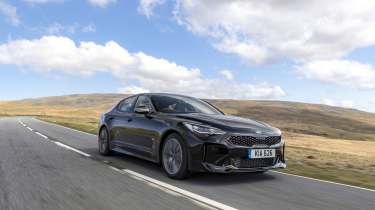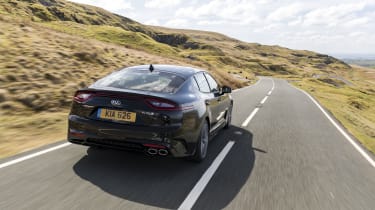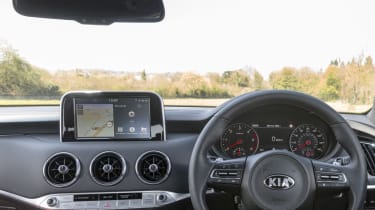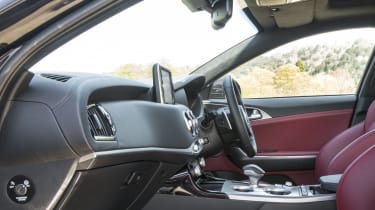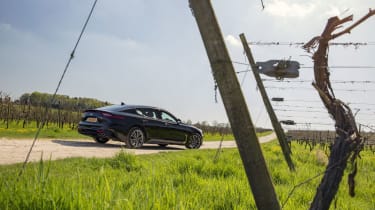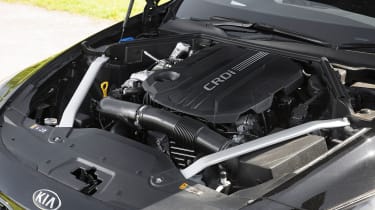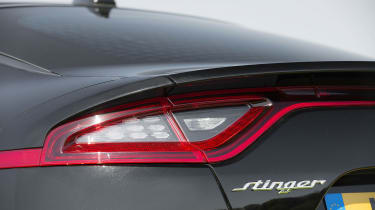Kia Stinger 2.2-litre CRDi review – diesel power suits the Stinger
An admirable first attempt at a flagship model, the Kia Stinger strikes a fine balance between and refinement and sportiness.
So far Kia has built a reputation on value and reliability, manufacturing a string of mainstream models ranging from city cars to seven-seat SUVs. This is not a premium brand - and until recently it hasn’t pretended to be. Even so, it hasn’t let a lack of experience in pricer, more niche segments from getting bold in its ambitions. The first fruit of its labour is the Kia Stinger, a sleek and stylish four-seater coupe aimed straight at BMW and Audi.
Our first drive in the Stinger came in the range-topping, twin-turbo 3.3-litre petrol V6 GT-S. We noted an exploitable, adjustable chassis – the work of ex-BMW M Division boss Albert Biermann – and decent refinement. To see if Kia has managed to transfer these qualities to less engined models we grabbed the keys to the expected best-seller: the 2.2 CRDi diesel.
Satisfying the GT criteria, the Stinger’s interior is clearly a step up from any Kia before it. A combination of leather and soft-touch materials trim much of the cabin, and where you do find plastics, they’re of a higher quality. All of which highlights the regrettably coarse, plastic steering-wheel boss, that would look more at home in a budget supermini. Still, given the high standard of the rest of the cabin, it’s a forgivable oversight.
The controls are well laid out on the centre console, with the slim, silvery infotainment button panel neatly integrated into the bottom edge of the wing-shaped dashboard. Below it sits the climate controls, which are easy to feel for and adjust thanks to its intuitive mix of buttons and rotary dials.
More reviews
In-depth reviews
Reviews
The interior is by no means revolutionary, but it looks and feels special enough, and the technology suite provided reflects the Stinger’s flagship status, even more so in midrange ‘GT-Line S’ trim which brings a sunroof, LED headlights and a 360 view camera.
Technical highlights
At 1,778kg the diesel Stinger is no lightweight, especially when you compare it to a BMW 420d Gran Coupe (1640kg) and Audi A5 Sportback 2.0 TDI (1520kg). So, to keep all the mass in check there’s the same, fully independent suspension arrangement from the GT-S, with Macpherson struts upfront and a multi-link setup, incorporating double wishbones, at the rear. However, the adaptive dampers from the GT-S are replaced with passive units, which like the former, have been developed at the Nurburgring. Elsewhere, the five driving modes – smart, eco, comfort, sport and sport+ – remain.
Of the three Stingers offered the diesel is equipped with the smallest and lowest grade brakes. Whereas both petrol models receive ventilated discs all-round, the diesel makes do with a ventailied pair up front and solid items at the rear, measuring 320mm and 315mm respectively. They’re concealed by 18-inch wheels, an inch smaller than those worn by the GT-S, shod with 225/45 R18 tyres.
Engine, transmission and 0-60mph
The Stinger posts respectable benchmark performance figures: it can crack 62mph in 7.6 seconds from a standing start and sail onto a 143mph top speed. For reference, the equivalently-priced Volkswagen Arteon is slower to 62mph (9.1 seconds), and fall shorts of the top speed too, managing just 137mph.
When you begin to extend the turbocharged 2.2-litre four-pot the Stinger accelerates in an effective but muted fashion, pulling hardest between 3,000 and 4,000 rpm; maximum power (197bhp) is delivered at 3,800rpm, so there’s little point venturing far beyond this peak. There’s ample low-down grunt, too, so the engine is perfectly tractable spinning slower, with maximum torque (325lb ft) available from 1,750rpm through until 2,750rpm.
Drive is channeled to the rear wheels via an automatic eight-speed torque converter and a limited-slip differential. Bearing in mind the gearbox is built in-house it’s a relatively slick performer and a well-judged match for the engine.
In comfort and eco the ‘box slurs shifts, under partial throttle, virtually undetected adding a welcome dose of refinement to the powertrain. Ramp things up to sport/sport+ and it shifts quicker and holds onto gears for longer, however it’s not all good.
Despite the presence of wheel-mounted paddles you can never take full control of the transmission. Using the paddles enables manual mode for a short period, before the ‘box takes back full control. On a twisty road you’re left frustrated, eagerly awaiting a downshift that inevitably arrives too late, after you’ve negotiated a corner.
What’s it like to drive?
Before you even turn a wheel the Stinger puts you at ease. It’s a doddle to find the perfect driving position, which is highly adjustable, so you can locate the major controls at ideal lengths away and seat yourself really low the chassis. The latter helps you gauge the saloon’s dimensions and familiarise yourself with its extremities.
On the move the Stinger feels lighter than its claimed kerbweight, while the positive steering fosters confidence. There’s a natural weight and directness to the helm that allows you to place the car intuitively through a series of bends. If they’re of a tighter radius, however, you’ll be forced to deviate from the ten-and-two position on the steering-wheel to dial in the necessary lock, with the seat bolstering often obstructing the arm as you twirl the wheel through a corner. Once you’ve mastered sleight of hand this is no longer a problem, and you can begin to explore the chassis’ adjustable nature.
Enter a corner with too much speed and the nose will wash wide as the Kia’s heft makes itself known. The thin-rimmed wheel starts to squirm, delivering decent feedback for the first time. Just as in the GT-S though, a measured application of the throttle can quell the understeer, rotating the car progressively – thanks to its long wheelbase – back towards the apex.
However, it’s not as easily executed. Metering out the correct throttle input is difficult in light of the diesel engine’s slower response and aggressive torque delivery.
Driven with less aggression, and tackling wider, faster corners, the Kia then feels moe settled. Here the balanced suspension setup contains roll and filters out minor, mid-corner imperfections. Push harder, on more testing surfaces, and the Stinger begins to unravel. That buttoned-down body control suffering as the damping struggles to keep pace with undulating surfaces.
That said, expecting the Stinger to be a cut-price sports saloon would be asking an awful lot, especially in diesel guise, where it best lends itself to loping along motorways. Considering it’s been conceived as a GT, its sporting credentials should be commended. They do little to comprise the Stinger’s overall comfort and refinement; the Kia’s relaxed gait makes easy work of long hauls, riding better on the smaller and taller rubber (compared to that of the GT-S).
As we’ve already discovered the diesel Stinger receives the ‘weakest’ brake package. However, that label turns out to be somewhat misleading – there’s ample stopping power. With no dead travel at the top of the pedal you get immediate bite, and further still, depress the pedal towards the stop and the brakes won’t wilt; ABS intervention is seldom required.
During more sedate driving through, heavy footwork can make for jerky going: the top of pedal is very sensitive so it can be grabby if you're not precise. Even so, it's something you would acclimatise to quick enough.
Price, specs and rivals
At £34,225 the diesel Stinger is keenly priced. Better still, the options list consists of nothing more than £645 paint finishes, with extra equipment bundled into the pricer, GT-Line S trim, at £3,000. With that comes: ventilated front seats, a 360-view camera, a 15-speaker system and LED headlights.
Standard specification is generous though, as it is with any Kia – electrically adjustable and heated front seats, a HUD, Android Auto/Apple CarPlay all feature, as do a heated steering wheel and full leather upholstery.
Rivals comes in the shape of the Audi A5 Sportback, BMW 4-series Gran Coupe and Volkswagen Arteon. You can purchase all three for the same money as the Stinger, however none are as well specified, or pack as much performance at the price point.
For example, the cheapest diesel Audi A5 Sportback, in entry-level SE trim, is priced at £35,565. That sum affords you a 2-litre diesel sporting a manual gearbox – opting for the automatic will set you back a further £1,500; an A5 Sportback with Stinger-rivalling performance costs £37k.
It’s a similar story for the Stinger’s Arteon counterpart in terms of price. It pairs a 148bhp 2-litre diesel with a seven-speed automatic transmission, so just like the Audi, it’s outgunned on the performance front. That said, it’s well-equipped.
The blanket German premium extends to the BMW 4-series Gran Coupe, with the direct Stinger rival, the SE, priced at £36,625.
